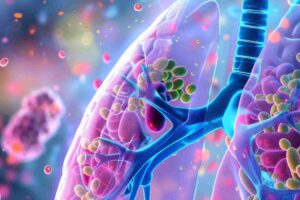A new clinical trial published in Nutrients evaluated the effects of ETB-F01, a formulation containing Enterobiome’s heat-killed Akkermansia muciniphila strain EB-AMDK19, on respiratory symptoms.
The double-blind, placebo-controlled study, conducted across multiple medical centers in South Korea, demonstrated that this next-generation probiotic (NGP) significantly alleviated breathlessness and cough in patients with subacute respiratory symptoms.
The study underscores the growing importance of the gut-lung axis in respiratory health. Researchers found that over 12 weeks, ETB-F01 improved Breathlessness, Cough, and Sputum Scale (BCSS) scores by an average of 0.8 points more than the placebo, achieving clinically meaningful benefits without severe adverse events.
These results highlight the potential for Akkermansia muciniphila to address respiratory conditions traditionally overlooked in the probiotic market.
Economic prospects: the emerging market for akkermansia
Once a niche player in the microbiome market, Akkermansia muciniphila has rapidly gained attention as a leading candidate for NGPs due to its multifaceted health benefits. Historically associated with metabolic health, the bacterium’s application in respiratory health could unlock new revenue streams.
The global probiotics market, valued at approximately $60 billion in 2023, is expected to grow at a compound annual growth rate (CAGR) of 7.2% through 2030. While traditional probiotics such as Lactobacillus and Bifidobacterium dominate the landscape, the next decade is poised for disruption by NGPs like Akkermansia. Analysts project the Akkermansia segment alone could reach a market value of $2 billion by 2030, driven by its novel applications in both chronic metabolic and respiratory conditions.
The expansion of this market aligns with rising consumer demand for scientifically validated probiotics. However, challenges remain, including the technological hurdles in stabilizing oxygen-sensitive strains like Akkermansia. Nevertheless, innovations in heat-killed formulations, as demonstrated in this study, may pave the way for broader commercialization.
Industry implications
Companies entering the Akkermansia market face a unique opportunity to position themselves at the intersection of cutting-edge science and unmet clinical needs. Partnerships between biotech firms and clinical research institutions could accelerate product development and regulatory approval.
Akkermansia muciniphila is not merely a scientific curiosity but a burgeoning economic force. Its emergence in the respiratory health sector represents a paradigm shift, offering promising avenues for innovation and investment. As research continues to unfold, this probiotic could redefine how we approach gut-lung health in the 21st century.














